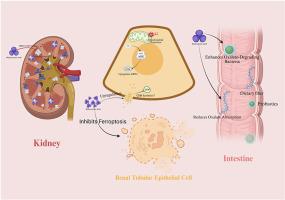功能食品中的羟基柠檬酸:预防草酸钙肾结石的多目标方法
IF 5.9
1区 农林科学
Q1 FOOD SCIENCE & TECHNOLOGY
引用次数: 0
摘要
本文评价了羟基柠檬酸(HCA),一种从藤黄果中提取的化合物,在预防草酸钙肾结石(一种常见的肾结石疾病)方面的潜力。本文旨在阐明HCA的多方面作用机制及其在功能食品中的应用。HCA通过结合钙离子抑制草酸钙结晶,减少晶体对肾小管上皮细胞的粘附。HCA通过核因子红细胞2相关因子2 (Nrf2)和谷胱甘肽过氧化物酶4 (GPX4)途径减轻氧化应激,抑制脂质过氧化驱动的细胞死亡,从而保护肾脏组织。将HCA加入功能性食品中,与益生菌和膳食纤维结合,可以减少肠道对草酸盐的吸收,从而降低结石形成的风险。临床前研究表明,HCA具有抑制草酸钙晶体形成和减轻氧化应激的潜力,为其协同Nrf2/ gpx4介导的铁下沉抑制及其在与益生菌和膳食纤维结合的功能食品中的潜力提供了新的见解。然而,有限数量的人体临床试验阻碍了其转化应用,需要严格的临床验证其疗效、最佳剂量和长期安全性,才能将HCA作为一种可行的预防肾结石的饮食策略。本文章由计算机程序翻译,如有差异,请以英文原文为准。

Hydroxycitric acid in functional foods: A multitargeted approach to preventing calcium oxalate nephrolithiasis
This review evaluates hydroxycitric acid (HCA), a compound derived from Garcinia cambogia, for its potential in preventing calcium oxalate nephrolithiasis, a common kidney stone disorder. This review aims to clarify HCA's multifaceted mechanisms and its applications in functional foods. HCA inhibits calcium oxalate crystallization by binding calcium ions and reducing crystal adhesion to renal tubular epithelial cells. HCA mitigates oxidative stress and inhibits ferroptosis, a lipid peroxidation-driven cell death, through the nuclear factor erythroid 2-related factor 2 (Nrf2) and glutathione peroxidase 4 (GPX4) pathways, thereby protecting kidney tissue. Incorporating HCA into functional foods, combined with probiotics and dietary fiber, may reduce intestinal oxalate absorption, thereby lowering the risk of stone formation. Preclinical studies demonstrate HCA's potential to inhibit calcium oxalate crystal formation and mitigate oxidative stress, providing novel insights into its synergistic Nrf2/GPX4-mediated ferroptosis inhibition and its potential in functional foods combined with probiotics and dietary fiber. However, the limited number of human clinical trials hinders its translational application, requiring rigorous clinical validation of its efficacy, optimal dosing, and long-term safety to establish HCA as a viable dietary strategy for kidney stone prevention.
求助全文
通过发布文献求助,成功后即可免费获取论文全文。
去求助
来源期刊

Food Bioscience
Biochemistry, Genetics and Molecular Biology-Biochemistry
CiteScore
6.40
自引率
5.80%
发文量
671
审稿时长
27 days
期刊介绍:
Food Bioscience is a peer-reviewed journal that aims to provide a forum for recent developments in the field of bio-related food research. The journal focuses on both fundamental and applied research worldwide, with special attention to ethnic and cultural aspects of food bioresearch.
 求助内容:
求助内容: 应助结果提醒方式:
应助结果提醒方式:


